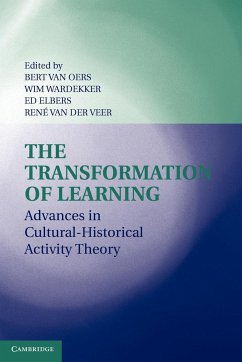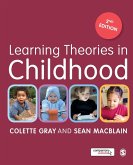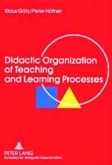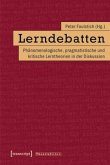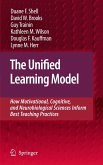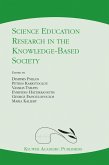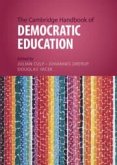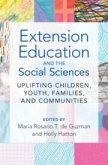The Transformation of Learning
Advances in Cultural-Historical Activity Theory
Herausgegeben von Oers, Bert van; Wardekker, Wim; Elbers, Ed; van der Veer, René
The Transformation of Learning
Advances in Cultural-Historical Activity Theory
Herausgegeben von Oers, Bert van; Wardekker, Wim; Elbers, Ed; van der Veer, René
- Broschiertes Buch
- Merkliste
- Auf die Merkliste
- Bewerten Bewerten
- Teilen
- Produkt teilen
- Produkterinnerung
- Produkterinnerung
The Transformation of Learning gives an overview of some significant advances of the cultural-historical activity theory, also known as CHAT in the educational domain. Developments are described with respect to both the theoretical framework and research. The book's main focus is on the evolution of the learning concept and school practices under the influence of cultural-historical activity theory. Activity theory has contributed to this transformation of views on learning, both conceptually and practically. It has provided us with a useful approach to the understanding of learning in cultural contexts.…mehr
Andere Kunden interessierten sich auch für
![Learning Theories in Childhood Learning Theories in Childhood]() Colette GrayLearning Theories in Childhood32,99 €
Colette GrayLearning Theories in Childhood32,99 €![Didactic Organization of Teaching and Learning Processes Didactic Organization of Teaching and Learning Processes]() Klaus GötzDidactic Organization of Teaching and Learning Processes49,25 €
Klaus GötzDidactic Organization of Teaching and Learning Processes49,25 €![Lerndebatten Lerndebatten]() Lerndebatten29,99 €
Lerndebatten29,99 €![The Unified Learning Model The Unified Learning Model]() Duane F. ShellThe Unified Learning Model97,99 €
Duane F. ShellThe Unified Learning Model97,99 €![Science Education Research in the Knowledge-Based Society Science Education Research in the Knowledge-Based Society]() D. Psillos / Petros Kariotoglou / Vassilis Tselfes / Evripides Hatzikraniotis / George Fassoulopoulos / Maria Kallery (eds.)Science Education Research in the Knowledge-Based Society193,99 €
D. Psillos / Petros Kariotoglou / Vassilis Tselfes / Evripides Hatzikraniotis / George Fassoulopoulos / Maria Kallery (eds.)Science Education Research in the Knowledge-Based Society193,99 €![The Cambridge Handbook of Democratic Education The Cambridge Handbook of Democratic Education]() The Cambridge Handbook of Democratic Education230,99 €
The Cambridge Handbook of Democratic Education230,99 €![Extension Education and the Social Sciences Extension Education and the Social Sciences]() Extension Education and the Social Sciences114,99 €
Extension Education and the Social Sciences114,99 €-
-
-
The Transformation of Learning gives an overview of some significant advances of the cultural-historical activity theory, also known as CHAT in the educational domain. Developments are described with respect to both the theoretical framework and research. The book's main focus is on the evolution of the learning concept and school practices under the influence of cultural-historical activity theory. Activity theory has contributed to this transformation of views on learning, both conceptually and practically. It has provided us with a useful approach to the understanding of learning in cultural contexts.
Hinweis: Dieser Artikel kann nur an eine deutsche Lieferadresse ausgeliefert werden.
Hinweis: Dieser Artikel kann nur an eine deutsche Lieferadresse ausgeliefert werden.
Produktdetails
- Produktdetails
- Verlag: Cambridge University Press
- Seitenzahl: 416
- Erscheinungstermin: 1. März 2008
- Englisch
- Abmessung: 229mm x 152mm x 24mm
- Gewicht: 620g
- ISBN-13: 9780521156981
- ISBN-10: 052115698X
- Artikelnr.: 30204792
- Herstellerkennzeichnung
- Libri GmbH
- Europaallee 1
- 36244 Bad Hersfeld
- gpsr@libri.de
- Verlag: Cambridge University Press
- Seitenzahl: 416
- Erscheinungstermin: 1. März 2008
- Englisch
- Abmessung: 229mm x 152mm x 24mm
- Gewicht: 620g
- ISBN-13: 9780521156981
- ISBN-10: 052115698X
- Artikelnr.: 30204792
- Herstellerkennzeichnung
- Libri GmbH
- Europaallee 1
- 36244 Bad Hersfeld
- gpsr@libri.de
1. Learning and learning theory from a cultural-historical point of view Bert van Oers; Part I. Tenets of Activity Theory: Introduction to Part I. Exploring Vygotsky's legacy: the meaning of mediation René van der Veer; 2. Multiple readings of Vygotsky René van der Veer; 3. Exploring the links between external and internal activity from a cultural-historical perspective Igor Arievich; 4. Reflections on points of departure in the development of sociocultural and activity theory Harry Daniels; 5. Language in cultural-historical perspective Peter E. Jones; 6. The formation experiment in the age of hypermedia and distance learning Hartmut Giest; 7. Constructivism and meaning construction Ronald Arendt; 8. Subject, subjectivity, and development in cultural-historical psychology Fernando Luis González Rey; Part II. Identity, Diversity, and Inclusion: Introduction to Part II. Identity, diversity, and inclusion Wim Wardekker; 9. Identity shifts in informal learning trajectories Anne Edwards and Lin Mackenzie; 10. No human being is illegal: counteridentities in a community of undocumented Mexican immigrants and children Jocelyn Solis; 11. Cultural identity and emigration: a study of the construction of discourse about identity from historical-cultural psychology Beatriz Macías Gómez Estern, Josué García Amián and José Antonio Sánchez Medina; 12. Diversity in the construction of modes of collaboration in multiethnic classrooms: continuity and discontinuity of cultural scripts Mariëtte de Haan and Ed Elbers; 13. 'Discourse' in cultural-historical perspective: critical discourse analysis, CHAT, and the study of social change Chik Collins; 14. Reason and dialogue in education Rupert Wegerif; Part III. Dynamics of Activity and the Variations of Learning: Introduction to Part III. Learning in social settings: challenges for sociocultural and activity theory Ed Elbers; 15. Children's learning through participation in institutional practice: a model from the perspective of cultural-historical psychology Mariane Hedegaard; 16. Dialogue for reasoning: promoting exploratory talk and problem solving in the primary classroom Sylvia Rojas-Drummond, Laura Gómez and Maricela Vélez; 17. What kinds of tools and resources are made available to students through effective guidance in a student-scientist partnership program? Jrène Rahm, Wendy Naughton and John C. Moore; 18. Girls on the sidelines: 'gendered' development in early childhood classrooms Sonja de Groot Kim; 19. Inscripting predicates: dealing with meanings in play Bert van Oers; 20. Pretend play and preschoolers Ricardo Ottoni Vaz Japiassu.
1. Learning and learning theory from a cultural-historical point of view Bert van Oers; Part I. Tenets of Activity Theory: Introduction to Part I. Exploring Vygotsky's legacy: the meaning of mediation René van der Veer; 2. Multiple readings of Vygotsky René van der Veer; 3. Exploring the links between external and internal activity from a cultural-historical perspective Igor Arievich; 4. Reflections on points of departure in the development of sociocultural and activity theory Harry Daniels; 5. Language in cultural-historical perspective Peter E. Jones; 6. The formation experiment in the age of hypermedia and distance learning Hartmut Giest; 7. Constructivism and meaning construction Ronald Arendt; 8. Subject, subjectivity, and development in cultural-historical psychology Fernando Luis González Rey; Part II. Identity, Diversity, and Inclusion: Introduction to Part II. Identity, diversity, and inclusion Wim Wardekker; 9. Identity shifts in informal learning trajectories Anne Edwards and Lin Mackenzie; 10. No human being is illegal: counteridentities in a community of undocumented Mexican immigrants and children Jocelyn Solis; 11. Cultural identity and emigration: a study of the construction of discourse about identity from historical-cultural psychology Beatriz Macías Gómez Estern, Josué García Amián and José Antonio Sánchez Medina; 12. Diversity in the construction of modes of collaboration in multiethnic classrooms: continuity and discontinuity of cultural scripts Mariëtte de Haan and Ed Elbers; 13. 'Discourse' in cultural-historical perspective: critical discourse analysis, CHAT, and the study of social change Chik Collins; 14. Reason and dialogue in education Rupert Wegerif; Part III. Dynamics of Activity and the Variations of Learning: Introduction to Part III. Learning in social settings: challenges for sociocultural and activity theory Ed Elbers; 15. Children's learning through participation in institutional practice: a model from the perspective of cultural-historical psychology Mariane Hedegaard; 16. Dialogue for reasoning: promoting exploratory talk and problem solving in the primary classroom Sylvia Rojas-Drummond, Laura Gómez and Maricela Vélez; 17. What kinds of tools and resources are made available to students through effective guidance in a student-scientist partnership program? Jrène Rahm, Wendy Naughton and John C. Moore; 18. Girls on the sidelines: 'gendered' development in early childhood classrooms Sonja de Groot Kim; 19. Inscripting predicates: dealing with meanings in play Bert van Oers; 20. Pretend play and preschoolers Ricardo Ottoni Vaz Japiassu.

